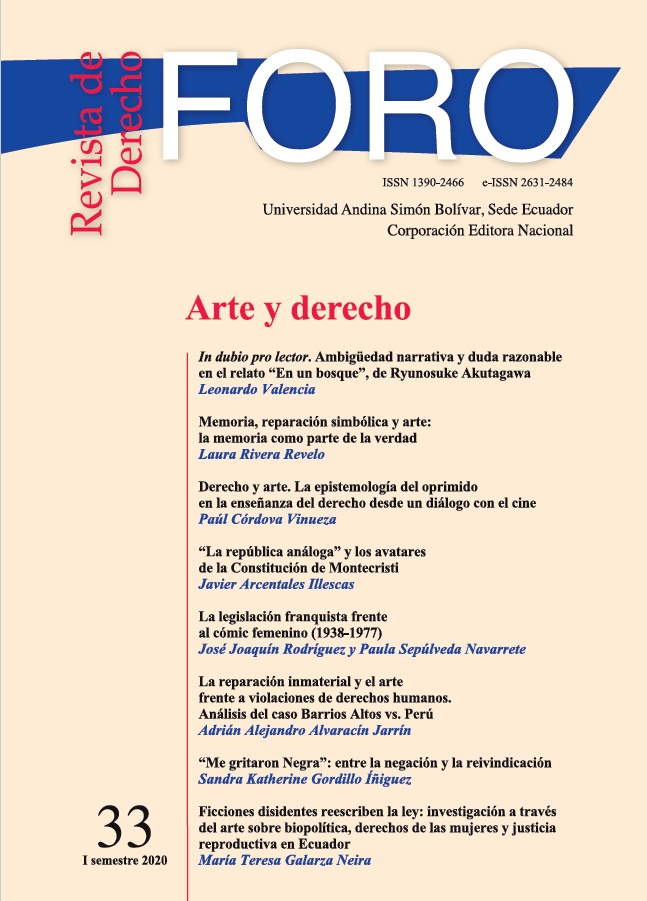Ficciones disidentes reescriben la ley: investigación a través del arte sobre biopolítica, derechos de las mujeres y justicia reproductiva en Ecuador
Contenido principal del artículo
Resumen
Este texto presenta mi investigación doctoral que, a través de la práctica artística de la escritura para cine, aborda cuestiones relacionadas con los derechos de las mujeres y la justicia reproductiva en Ecuador y Latinoamérica. Las preguntas básicas que articulan la reflexión son: ¿es posible crear una ficción de base legal que constituya una argumentación política sobre justicia reproductiva, evidenciando los modos en los que la ley vulnera los derechos de las mujeres en Ecuador y América Latina? Y, si es posible, ¿será capaz tal ficción de desafiar, cuestionar o complementar la legislación vigente, restituyendo simbólicamente los derechos vulnerados?
En esta investigación la práctica de la escritura creativa, que toma la forma de un guion cinematográfico, procura interpelar varios instrumentos internacionales de derechos humanos, la Constitución y el Código Orgánico Integral Penal del Ecuador y múltiples instrumentos de política pública ecuatoriana, con relación a los derechos de las mujeres. El guion constituye el resultado de un particular ejercicio de hermenéutica jurídica, en el que a través de la fuerza heurística que Paul Ricœurreconoce a la ficción, cuatro personajes femeninos encarnan y problematizan ciertas ficciones jurídicas respecto de los derechos reproductivos en Ecuador.
La investigación propone una trayectoria del poder biopolítico para interrogar la vida como potencia y un cuerpo femenino como vida desnuda. Ficciones disidentes reescriben la ley procura hacer visibles los modos en los que la legislación ecuatoriana y sus estrategias biopolíticas de aplicación vulneran los derechos de las mujeres. En última instancia, siguiendo las ideas de Jacques Rancière, la ficción procura inducir al disenso como táctica para lograr una restitución simbólica de los derechos vulnerados
##plugins.themes.bootstrap3.displayStats.downloads##
Detalles del artículo
Sección
CESIÓN DE DERECHOS, DECLARACIÓN DE CONFLICTO DE INTERESES Y DIFUSIÓN
Los autores/as que publiquen en esta revista aceptan las siguientes condiciones:
- Los autores ceden a la Foro: Revista de Derecho, el derecho de la primera publicación. Las obras se publican en la edición electrónica e impresa de la revista bajo una Licencia Creative Commons 4.0 de Reconocimiento No Comercial-Compartir Igual 4.0, que habilita a compartir, adaptar y atribuir el trabajo (ver: Políticas de acceso abierto).
- Ver información completa de cesión de derechos, declaración de conflicto de intereses y difusión, aquí
Cómo citar
Referencias
Agamben, Giorgio. Homo sacer: sovereign power and bare life. Traducido por Daniel HellerRoazen. Stanford: Stanford University Press, 1998.
––. Homo sacer. El poder soberano y la nuda vida. Valencia: Pre-Textos, 1998.
Bakunin, Mijaíl. La libertà degli uguali. Milan: Elèuthera, 2009.
Benjamin, Walter. “Critique of Violence”. En Reflections: essays, aphorisms, autobiographical writings, editado por Peter Demetz, traducido por Edmund Jephcott, 277-300. Nueva York: Schocken Books, 1986.
Bottici, Chiara. Imaginal Politics: Images beyond Imagination and the Imaginary. Nueva York: Columbia University Press, 2014.
––. “Rethinking the Biopolitical Turn: From the Thanatopolitical to the Geneapolitical Paradigm”. Graduate Faculty Philosophy Journal. Vol. 36, n.º 1 (2015): 175-97.
Cavarero, Adriana. “ ‘A Child Has Been Born unto Us’: Arendt on Birth”. Philosophia. A Journal of Continental Feminism. Vol. 4, n.º 1 (2014): 12-30.
Deleuze, Gilles. “Immanence: A Life”. En Pure Immanence. Essays on A Life, editado por Gilles Deleuze, traducido por Anne Boyman, 25-33. Nueva York: Zone Books, 2012.
Ecuador. Constitución de la República del Ecuador. Registro Oficial 449, 20 de octubre de 2008.
––. Código Orgánico Integral Penal. Registro Oficial Suplemento 180, 10 de febrero de 2014.
Esposito, Roberto. Bíos: Biopolitics and Philosophy. Minnesota: University of Minnesota Press, 2008.
Federici, Silvia. Caliban and the Witch. Women, The Body and Primitive Accumulation. Nueva York: Autonomedia, 2004.
Foucault, Michel. The Will to Knowledge. History of Sexuality. Vol. I. Nueva York: Pantheon Books, 1978.
Galarza, María Teresa. “Dissenting fiction re-righting law: practice-led research into biopolitics, women’s rights and reproductive justice in Ecuador”. Tesis doctoral, The University of Melbourne, 2017. ‹https://minervaaccess.unimelb.edu.au/handle/11343/210743›.
Leavy, Patricia. Fiction as Research Practice: Short Stories, Novellas, and Novels. Walnut Creek, CA: Left Coast Press Inc., 2013.
Ministerio de Salud Pública del Ecuador. Indicadores Básicos de Salud 2010. Quito: MSP /
INEC / Organización Panamericana de la Salud, 2011.
––. Indicadores Básicos de Salud 2012. Quito: Ministerio de Salud Pública, 2013.
––. Plan Nacional de Salud Sexual y Salud Reproductiva. Quito: Viceministerio de Gobernanza de la Salud Pública, 2017.
Ministerio de Salud Pública del Ecuador e INEC. Encuesta Nacional de Salud y Nutrición. Tomo II. Salud Sexual y Reproductiva. Quito: Ministerio de Salud Pública / INEC, 2015.
O’Reilly, Andrea. Matricentric Feminism. Theory, Activism, and Practice. Ontario: Demeter Press, 2016.
Paul, Alvaro. “Controversial Conceptions: The Unborn and the American Convention on Human Rights”. Loyola University Chicago International Law Review. Vol. 9, Issue 2 (2012): 209-47.
Rancière, Jacques. Dissensus: On Politics and Aesthetics. London: Continuum, 2010.
Ross, Loretta J., y Rickie Solinger. Reproductive justice. An introduction. Oakland: University of California Press, 2017.
Ruddick, Sara. Maternal Thinking. Toward of Politics of Peace. Boston: Beacon Press, 1995.
Zaragocin, Sofía, María Rosa Cevallos, Guglielmina Falanga, Iñigo Arrazola, Gabriela Ruales, Verónica Vera y Amanda Yépez. “Mapeando la criminalización del aborto en el Ecuador”. Revista de Bioética y Derecho, n.o
(2018): 109-25. ‹http://scielo.isciii.es/pdf/bioetica/n43/1886-5887-bioetica-43-00109.pdf›.


